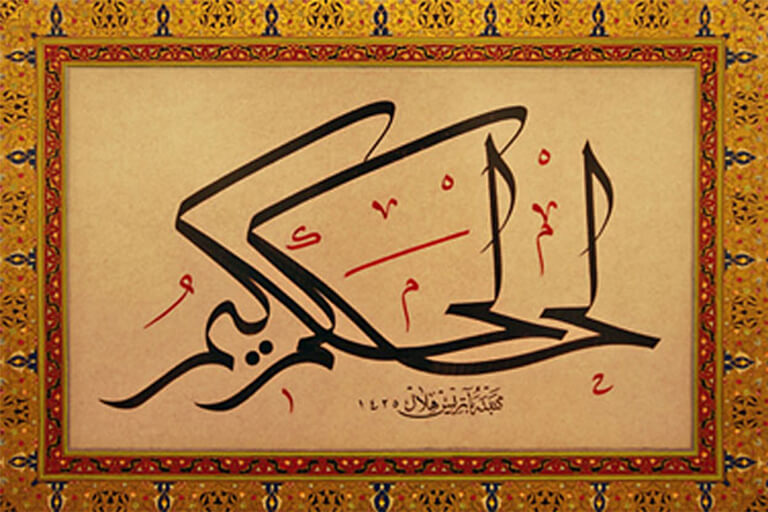Muslim Voices — Calligraphy

Audio transcript:
0:00:06:>>MANAF BASHIR: Welcome to Muslim Voices. I'm your host Manaf Bashir. Calligraphy is considered, by many, the highest form of Islamic art. Many calligrapher strive to beautify written Arabic to make it worthy of God. But it's not only Arabic that's entranced calligraphers. Persian is another language artists have attempted to beautify. Shidha Riahi is from Isfahan, an ancient city in Iran. Riahi studied calligraphy with a master in Iran before coming to Indiana University where she now studies Islamic art. Rosemary Pennington spoke with Riahi about why calligraphy has become so important to her.
0:00:48:>>SHIDHA RIAHI: It was almost eight years ago that I went to and domain the question of design. It's the community of calligraphers in Iran and they have a big school of calligraphy. And I had a master there - was Luzander - was my master. And I started practicing Nasta Ali - one of the Persian styles of calligraphy. And then I switched to Thuluth or Solsi Farsi - we would say its sols, which is one of the Arabic styles of calligraphy. And I really liked it because with that calligraphy I could write Quranic verses and I was so interested in writing the Quranic verses. It helped me to memorize those verses and it's very beautiful.
0:01:33:>>ROSEMARY PENNINGTON : When you are practicing calligraphy - I've heard people say that, in a way, for them it's sort of - it's one of many ways to become closer to Allah and to understand the religion better. I mean, is that what it's like to you? I mean, when you are practicing calligraphy is it not only an art form but a sort of a religious thing as well?
0:01:50:>>SHIDHA RIAHI: To answer your question, I can't say yes or no. It depends on what you are writing. If you are writing a Persian poetry, it's not directly related to religion. But what I can say is when you are practicing an art, - especially a sacred art like calligraphy - in Islam or maybe in Chinese tradition, you go to another world. You somehow disconnect yourself from the all the crowds of this world and then you'll have a peace in your mind. And if you are really aware of what's happening to you, you can concentrate on Allah and, you know, you can - if you write the name of Allah, he is present in his name. So you have the direct connection with that name. But if you are not aware and you are just doing it as fun - as some people would say - of course, it helps you, it makes you calmer. But it doesn't have anything with religion. So it is really depends on your perspective and your attitude towards the practice of calligraphy.
0:02:59:>>ROSEMARY PENNINGTON : Do you have any of your calligraphy that we could look at this morning?
0:03:02:>>SHIDHA RIAHI: Certainly, yes. I can show you. This one is my calligraphy. I've written it in sols style but it's a Persian poetry - Persian piece.
0:03:15:>>ROSEMARY PENNINGTON : So this is the Arabic. correct?
0:03:16:>>SHIDHA RIAHI: Yes, exactly. This is the Arabic one. But I used it to write a Persian poetry, just to see how it looks like because when you write Persian in Arabic style, you don't have all the vowels. So it doesn't look as glorious as this piece of Arabic (non-English language spoken). Because it has all the vowels and, in this case, it's all in red and it's very elaborate, so it looks very beautiful. I wrote this piece of poetry, Persian poetry, in Arabic and it doesn't look that gorgeous. But I can show you something. Well, unfortunately, I cannot say that I am an artist. But everything that I make, I make it for gift, so I give it away.
0:04:01:>>ROSEMARY PENNINGTON : You don't think that you're an artist.
0:04:03:>>SHIDHA RIAHI: Well, I have practice and I really like it but, well, I'm not a master.
0:04:09:>>ROSEMARY PENNINGTON : So when you're writing your calligraphy - I mean, it seems like you have to be very connected to the language to be able to do this well. But then it also seems like it is very much a pursuit of beauty.
0:04:22:>>SHIDHA RIAHI: Certainly, yes. I completely agree with you. That's true. Just knowing the language doesn't help if you don't know what you're writing. For me, I have practiced a little bit of Chinese characters. It's beautiful, it's very refreshing but I don't understand anything. But I'm sure a master of Chinese calligraphy would enjoy it much better.
0:04:48:>>MANAF BASHIR: Shidha Riahi is a calligrapher in Bloomington, Ind. She's also a master's student at Indiana University studying Islamic art. This has been Muslim Voices, a production of voices and visions in partnership with WFIU public media from Indiana University. Support for Muslim Voices comes from the Social Science Research Council. You can subscribe to our podcast on iTunes or join the discussion on our website. Find us online at MuslimVoices.org. (2008-11-17)_10-Muslim-Voices-Calligraphy


 IU Global
IU Global